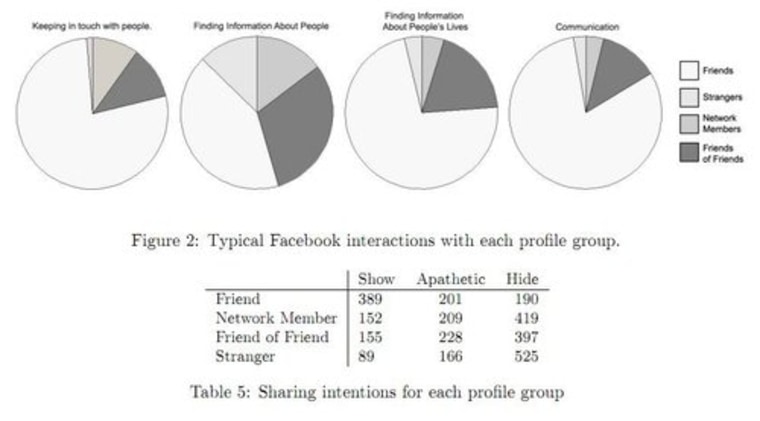Many people on Facebook have something to hide from someone. It could be those drunken snapshots of a misspent youth that might be a liability when you're looking for a job (or running for public office). Or, it could be anything on the basic profile facts that are ok to share with friends, but not acquaintances who have access to Facebook info in an age where digital networking is vital to job security. But the way Facebook is set up, it doesn't meet most users' expectations for privacy.
A recently released study from Columbia University found that an overwhelming number of respondents — almost 94 percent — revealed information they didn't intend to, while hiding things they had actually intended to share (almost 85 percent).
Concurring Opinions hits it on the head: "Facebook users either shared too little or too much information using Facebook’s privacy settings."
Here's the problem, as boiled down by the study's researchers:
One of the largest culprits for privacy flaws is Facebook's reliance on data types for defining default privacy settings. These datatypes are misrepresentative of the real world that Facebook attempts to model. Outside of a social network, an individual does not determine visibility of personal data by its format but instead by the context of its information.
The study found that every one of the 65 Columbia University students who participated in the study "was sharing something they wished to hide, or was hiding something they wished to share. Both cases represent a shortcoming of the privacy settings."
The study's researchers, Michelle Madejski, Maritza Johnson and Steven M. Bellovin, concluded that Facebook's "current approach is fundamentally awed. We recommend improvements to the current mechanism based on our findings, and suggest directions for future work."
They recommend "Facebook regularly conduct similar studies to evaluate their privacy mechanisms, especially as new features are introduced."
Like many of us, the study's participants had no problems sharing their lives and information with friends — real ones who also happen to be friends on Facebook, too — but want to restrict the daily reveals to acquaintances who happen to be Facebook friends (because of networking, perhaps?) or friends of Facebook friends who are strangers to them.
The researchers think that "modications to existing settings and future settings on behalf of the user should err on the side of restricting information visibility." In fact, the study suggests that if users consistently choose to hide that information — such as visibility on Facebook Places — then the default should be hidden.
They also argue that although there are privacy settings for most data, most users have so much data, that oversights would be commonplace.
When participants were asked why they chose to hide the basics on their profile, the most common reason given was "due to physical security and the fear of potential harm." Yet, "participants prioritized physical security lower than other types of security."
Most of the participants (62 out of 65) thought their Facebook privacy settings matched their expectations, when the study's results showed that untrue. The three who didn't think their settings were aligned with their attitude toward privacy were aware enough to realize Facebook didn't have the privacy controls they wanted, or they admitted not having enough time to set it the way that they thought would match their privacy concerns, or they admitted they didn't know how to do it.
Even though the number of participants in the study was small, researchers found an average friend count of 601, with a network group size of nearly 76,000 members. The "stranger group size" was estimated at 500 million, which corresponds with the number of Facebook users (although the number of 600 million has been widely reported). The estimate of friends of friends, based on the average friend count, was about 354,000.
One solution Concurring Opinions presented was this:
Facebook’s privacy settings could allow users to show information about sex, drugs, and dislikes to friends while they could share their views about politics, academics, and religion with friends of friends. With specific categories of information as default privacy settings, most violations identified by the study would have been avoided.
If you're truly concerned about the information you're exposing to Facebook users, maybe the best thing is to write nothing at all in those basic profile data fields, or to delete what you don't want out there for general consumption, if you really want to be safe. Otherwise, you could do regular checks of those privacy settings.
More Facebook stories:
- Users to Facebook: Forget 'memorable' status updates
- Facebook and Christianity don't mix, says Chicago parish
- New tool helps clean up your Facebook reputation
Check out Technolog on Facebook, and on Twitter, follow Athima Chansanchai, who has to go through her privacy settings on Facebook. Again.
